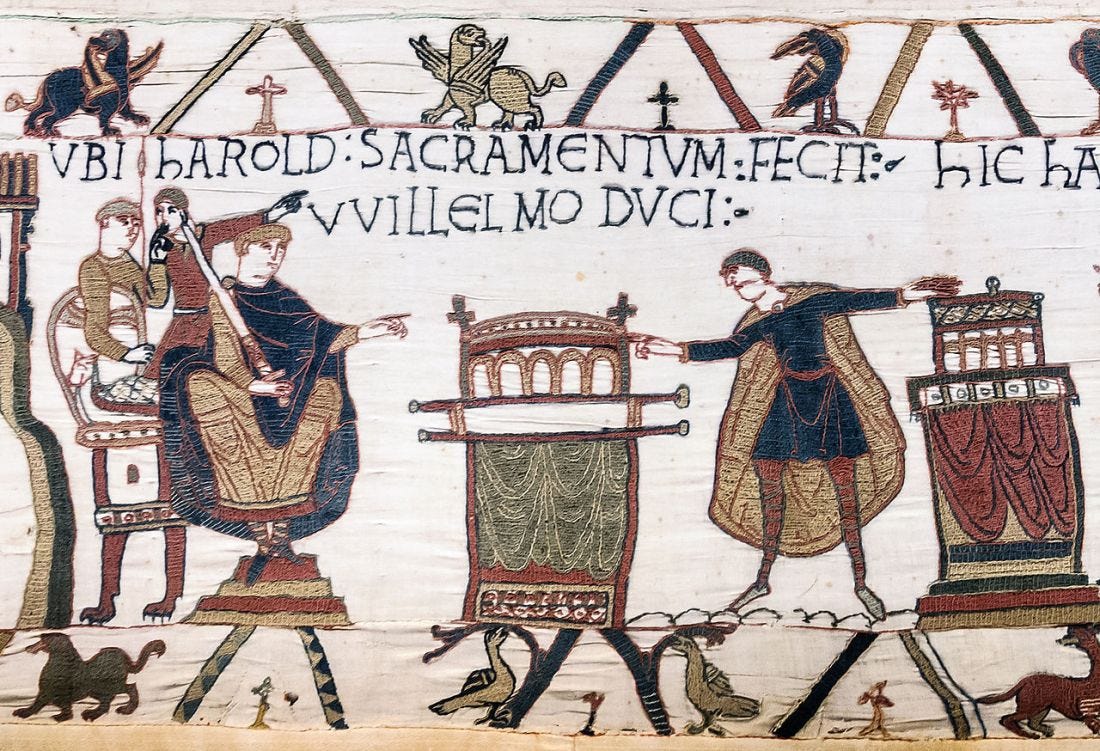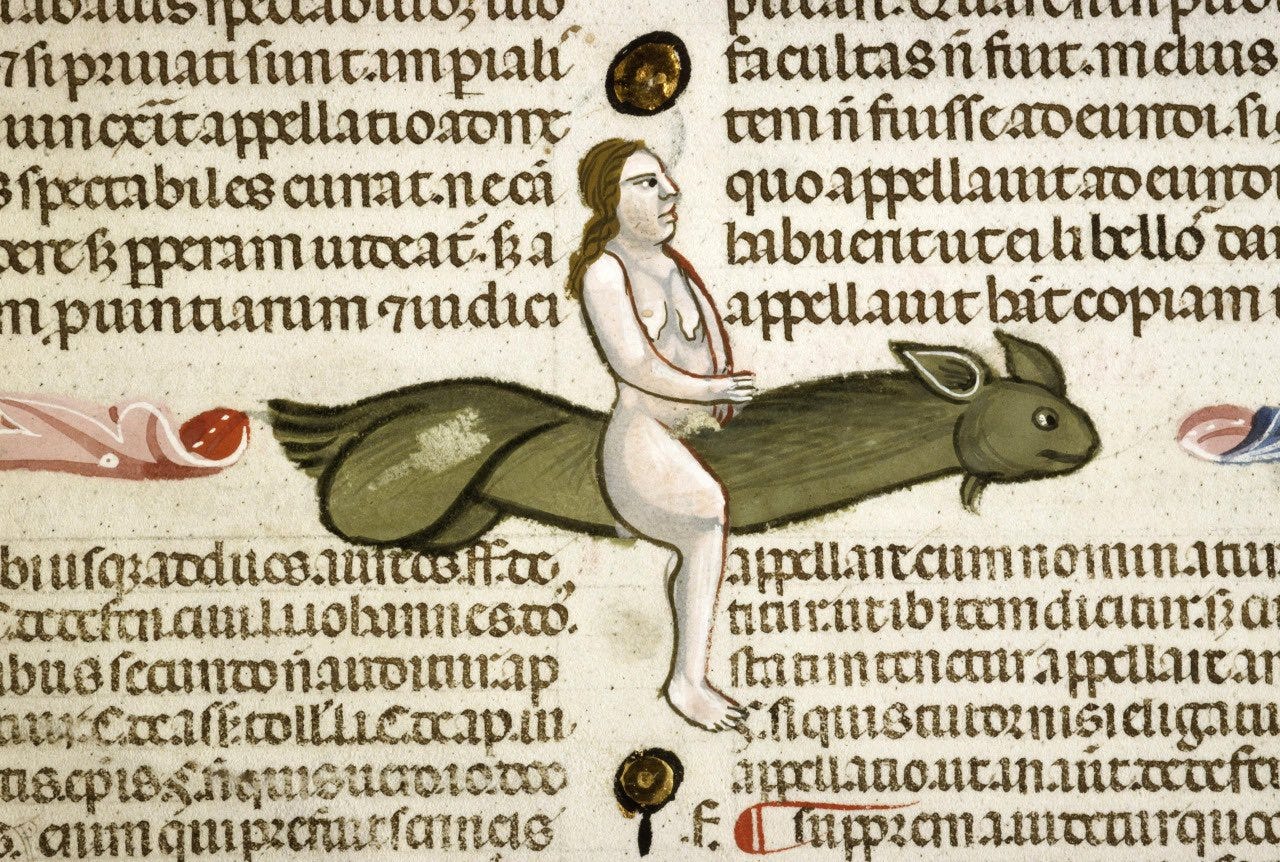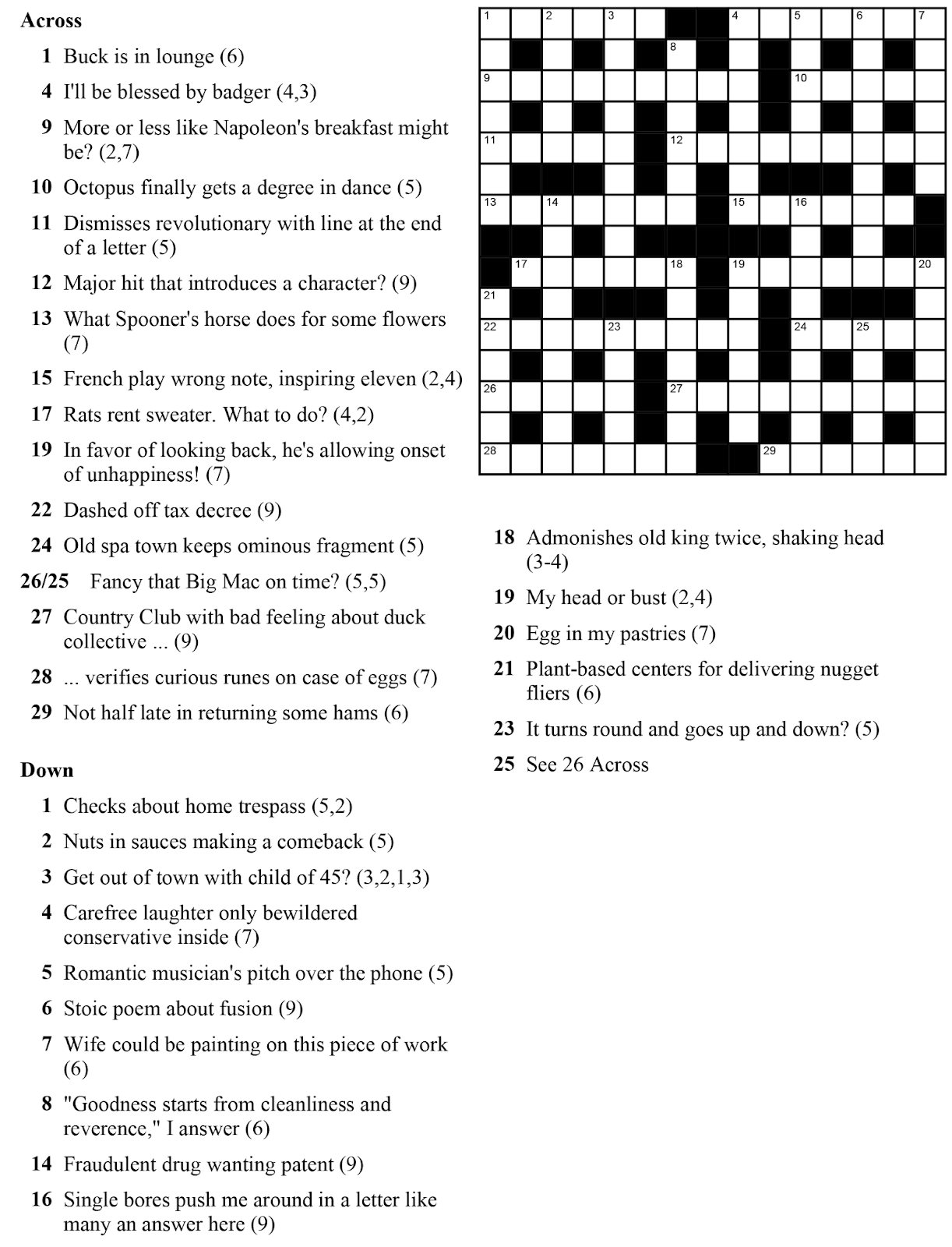Swearing: How it started. How it's going.
Seven truly remarkable events in the history of swearing
Skip to the end (or click here) for a puzzle I’ve made you. My crash course on how to do cryptic puzzles begins here.
We’ve been swearing roughly as long as we’ve been stubbing our toes or tripping over the (Proto-Indo-European) cat on the way to the (Proto-Indo-European) bathroom in the night. But the types of words that fit the category of what we consider to be “swear words” in English have changed dramatically in the last couple of thousand years. As the linguist Melissa Mohr shows in a fascinating history of swearing, Holy Sh*t, what counts as a forbidden or shocking word underwent a major shift from making oaths before God in the Middle Ages to referring to bodily acts in the Renaissance and beyond. If you wanted to offend a medieval, you’d be much better off talking blithely about “God’s arms” than telling raunchy stories about who swived the Miller’s wife when he went into town.
It’s been almost 2,000 years since a Pompeiian took time out of his day to write, “Restituta, take off your tunic, please, and show us your hairy privates,” on a wall in the courtyard of the Tavern of Verecundus (as shown in the image above), and as charmingly familiar as ancient Roman rudeness is to our own sensibilities, the art of swearing has taken some absolutely wild twists and turns along the way. In no particular order, here are a few notable happenings in the history of swearing.
1. The medievals thought that swearing literally tears God’s body apart …

According to Mohr, swearing an oath for the medievals was asking God to witness your statement with His very body, so that “When you swear ‘by God’s nails,’ you tear the nails out of God’s hand as he sits in heaven.” This isn’t to say that this sort of swearing was forbidden—it was just an incredibly potent reason not to take an oath trivially or falsely.
2. … but they would have been baffled by the words we consider obscene now
For a number of reasons, but most notably because there wasn’t any privacy in the Middle Ages, words that related to defecation or copulation—which make up a pretty healthy portion of modern swear words—were largely inoffensive before the late 1500s. So much so, that streets got names like Shitwell Way, and—rather wonderfully—the name for the common kestrel was “Windfucker,” because of the motions they make when they’re hovering in place.
3. There’s a truly delightful 15th century ballad in which 10 women complain about their husbands’ penises

Long before “cock” became a (mild) swear word, the hipster way to talk about a penis was to refer to it as “ware” or “meat” or call it a “pintle” a “tarse,” or a “lome.” The late 15th Century ballad “A Talk of Ten Wives on Their Husbands Ware” uses all five expressions. The whole poem is an out-and-out banger, but some highlights include wife number five saying,
Now ye speke of a tarse!
In all the warld is not a warse
Than hathe my hosbond.
And wife number seven responding that her husband’s junk reminds her of a tiny hen sitting on a pair of addled eggs:
Whon owre syre comys in,
And lokes after that sory pyne
That schuld hengge bytwen his leggis,
He is lyke, by the Rode,
A sory laveroke satt on brode
Opon two adyll eggis.
I recommend reading the whole thing. It absolutely holds up.
4. The first written instance of the word “fuck” is a monk complaining about his boss in 1528

In an early 16th century copy of Cicero's moral philosophical work De Officiis—next to a passage dealing with when, if ever, it’s acceptable to deviate from strict morality—a monk has written the words "O d fuckin Abbot." This is by many accounts the very first instance of our most famous swear word in writing. According to Mohr, the abbot referred to—John Burton—was known to be a villain, and the “fuckin” was—presumably—literal, as “fucking” isn't found in English as an intensifier until 300 years later. Amusingly, the “d” in this legendary piece of sniping is (thought to be) for “damned,” which would have been far more scandalous to write out than the eff-word it precedes.
5. You can stock up on all the best Georgian swear words with Francis Grose’s 1755 “Classical Dictionary of the Vulgar Tongue”
I’ve tried to be restrained and mature in discussing this adult topic, but I feel like I’d be letting readers down if I didn’t draw attention to the fact that one of history’s most important collections of English dirty words and slang was compiled by a man named Francis Grose and his faithful assistant Tom Cocking. It warms my very heart to know that 270-odd years ago, two men certifiably named Grose and Cocking were patrolling the mean streets of London listening for naughty words so that we could enjoy them today. You can read the 1811 edition of Grose’s dictionary at your leisure, but here are a few favorites:
BEARD SPLITTER. A man much given to wenching.
BLIND CUPID. The backside.
TO BLOW THE GROUNSILS. To lie with a woman on the floor.
DIDDEYS. A woman's breasts or bubbies.
PEGO. The penis of man or beast.
PISS PROPHET. A physician who judges of the diseases of his patients solely by the inspection of their urine.
RANTALLION. One whose scrotum is so relaxed as to be longer than his penis, i.e. whose shot pouch is longer than the barrel of his piece.
6. There are 9 distinct ways to use the word “fuck”
According to the linguists Anthony McEnery and Zhonghua Xiao, there are 9 discrete ways to deploy the eff-word in English—as a general expletive, as a personal insult, as a cursing expletive, destinationally (as in, fuck off!), literally, as an intensifier, idiomatically, and metalinguistically. Their 2004 paper on the topic has a very neat chart that devoted swearers will find quite helpful.
7. Swearing happens in a different part of the brain from other speech
The part of your brain that’s responsible for swearing is distinct from the part of your brain that processes language more generally. This is borne out by studies of people who have lost their ability to speak normally but still have no trouble summoning curse words.
For so very much more on the history of swearing, try Melissa Mohr’s Holy Sh*t: A Brief History of Swearing, Benjamin K. Bergen’s What the F: What Swearing Reveals About Our Language, Our Brains, and Ourselves, and of course, the endlessly entertaining Classical Dictionary of the Vulgar Tongue … by Grose and Cocking.
I have made you a puzzle. The puzzle image is below if you want to print it out like our forebears used to, but you can also fill it in with a click!








It can also reduce feelings of pain temporarily